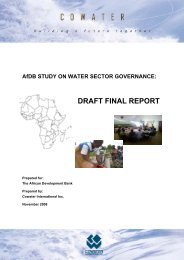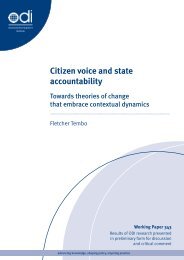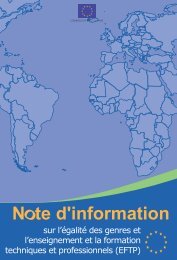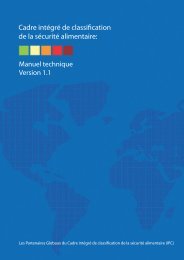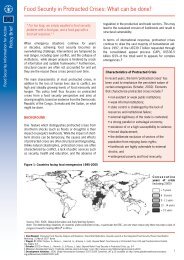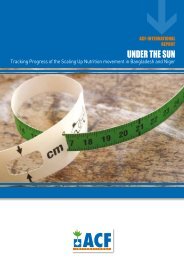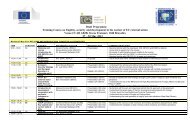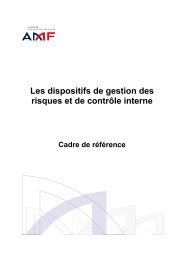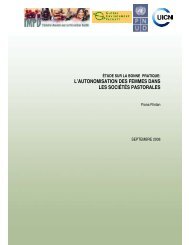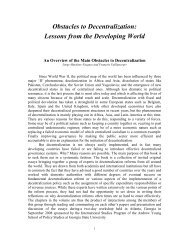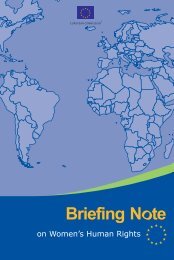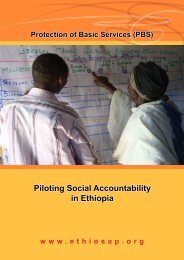Project Progress Report - Capacity4Dev
Project Progress Report - Capacity4Dev
Project Progress Report - Capacity4Dev
You also want an ePaper? Increase the reach of your titles
YUMPU automatically turns print PDFs into web optimized ePapers that Google loves.
EU-PARMARTH Yearly <strong>Progress</strong> <strong>Report</strong> April 2012Annual <strong>Progress</strong> <strong>Report</strong>/Interim <strong>Report</strong>OfEstablishing Women’s First Right to Water Resources<strong>Report</strong>ing Period:April 2011-March 2012<strong>Project</strong> Implemented BY:Parmarth Samaj Sevi SansthanMona House Churkhi RoadOrai, Distt-Jalaun (U.P.)INDIASupported By:European Union
EU-PARMART Yearly <strong>Progress</strong> <strong>Report</strong>1. Description1.1Name of Beneficiary of Grant Contract: Parmarth Samaj Sevi Sansthan1.2 Name and title of the Contact Person: Mr. Sanjay Singh1.3 Name of the Partner in action: Women Feature Service, New Delhi1.4 Title of the Action: Establishing Women‘s First Right to Water Resources1.5 Contract Number: DCI-NSAPPVD/2011/260-6121.6 Start date and end date of the reporting period: April 2011 till March 20121.7 Target Country (ies) or Region(s):Districts of Jalaun, Hamirpur and Lalitpur ofBundelkhandregion,State of Uttar Pradesh1.8 Final Beneficiaries and /or Target Groups:RuralWomen, Gram Panchayats, VillageCommunities, other multi stake holders1.9. Country (ies) in which the activities take place (if different from 1.7) Not applicableGeneral:During reporting period of first year the project focused on planned activities and actionsthough, there has been slight deviation and non-implementation of four activities. Nevertheless,the patriarchal feudal perception, cultural ethos, resistance and time consumed in rapportbuilding in Hamirpur district villages, State Assembly Election, and other external factorsattributed to slow initiation or non-implementation a few of the planned programmes. However,the first year planned activities were mainly focused on mobilization and creating awareness,through wide range of actions—Women‘s First Right to Water and Resources, in the targeted 96villages and 22579 households in three districts of Jualan, Lalitpur and Hamirpur. Therefore, theproposal for the action differentiated between direct beneficiariesand indirect beneficiaries, theformer being equivalent with the concept of target grouping in this context. There is only onesignificant deviation from planned activity and non-planned activity, the empirical research studyon ‗women‘s right to water‘ was under taken, and the report is under preparation. The numberof women targeted through research, awareness, public campaign and training programmes wasenvisaged for the first year, 4000. In fact 5120community women from and local panchayatleaders other community members and multi stake holders have been benefited from the projectand programme. Therefore, the direct or indirect beneficiaries were reached by the action asenvisaged for the first year in the proposal—April 2011 to March 2012.2. Assessment and Implementation of Activities and Actions:2.1 Executive Summary of the Actions:The project was implemented in 96 villages of 60 Gram Panchayat of Talbehat, Sarila andMadhogarh blocks of Lalitpur, Hamirpur and Jalaun district of Bundelkhand region in UttarPradesh. The proposed action was implemented in most regressive villages of Dalits and tribalesand other backward communities. These villages are predominantly dominated by patriarchalfeudal upper caste landlords—controlling social milieu, trade and employment opportunity,political positions and other cultural insights. The caste, class and gender discrimination arerampantly inevitable though, it is also manifested by violence and human rights violation as wellin the region. The generation of suppression and abuses has been eroded the confidence andself-esteem of these invisible local marginalized communities, particularly so among women andyouth despite of globalised order. With this backdrop PARMARTH initiated the communitymobilization, andpublic awareness campaigns on forms of abuses, violation that dominates inParmarth Samaj Sevi Sansthan Page 2
EU-PARMART Yearly <strong>Progress</strong> <strong>Report</strong>action as when required to assert their water right and demand for their entitlements, servicesand delivery mechanisms.‣ 14 cases of water rights violation was reported to Pani Panchayat, under its leadershipthese cases have been received attention by local government authority for redressmechanism.‣ Pani Panchayt of Ghaholi villagesof Mama Gram Panchayat in Hamirpur district hastaken the responsibility for maintenance of ponds other water bodies.With the collectiveeffort of Pani Panchayt, around 40 villagers have been mobilised to clean up the villageponds on volunteer basis regularly.‣ The Pani Panchayt members regularly attend Gram Sabha meetings and claim theirstakes in the meeting by demanding to include their decision on communitydevelopment and entailments matters.Creation of Jal Sahelis: As per project vision,creation of Jal Sehali was mooted,by identifyingtwo women cadre from each targeted village of 96. So that,with the aim, these women cadrescanbecome watch dogs and address the issue of water resources and other development agendawith Gram Sabha, in Panchayat meetings, and also to highlight the problems with blockdevelopment officials. With this consent… and realising its importance the village women haveidentified 161 Jal Sehelis who have become activemembers andhave engaged themselves byplaying keyinstrumental role in grounding the project aims and specific objectives. Evidently,Women First Right to Water Resources and the issues that are connected to it have been theirpriority concern and learning. It is thus, the Jal Sehalisnetworks have become catalyst of watchdog and have induced to change makers in the villages by liasioning with service providers andrepresentatives of PRIs bodies.Their engagement with issues has facilitated them to mobilize andstimulate collective actionsof pressure building groups in the villages in order to realize‗Women‘sFirst Right to Water Resources‘ 2 .Media Intervention:Creation of Website: Website was constructed with the help of WFS http://bundelkhandwater-rights.org/index.phpon May 31, 2011. Regularly, the web portal has been up loaded witheach and every activity, action, related photographs, and other related news for wider audience.The portal also has become element of knowledge sharing bank to wider audiences and othernetworks those who working on water rights worldwide. On the other hand the portal hascreated visibility to project and programmes among web browsers and mainstream media as well.Publication of Newsletters in Hindi and English: During project period 1000 copies of JalAdhiikar Jeevan Aadhar three issues each has been published in Hindi. 200 copies of, Englishversion, Water Matters, Water Rights three issue has been published. These newsletters havebeen disseminated to wide range of audience including government departments, otheradministrative authorities, and legislative bodies etc.Media Interface Workshop with Local Mainstream media personnel: Media interfaceworkshop was organised on August 11, 2011, at Hotel Sunrise, Orai, and 21 journalists attendedthe workshop. The half day workshop was facilitated by WFS team. The workshop focusedon— issues of water rights, gender dimension and its vulnerability, exclusionof women andDalits in delivery mechanism. The challenges and problems faced by the communities in theBundelkhand region of Uttar Pradesh. The session drew up by news analysis of two leading local2 Jal Sehali case studyParmarth Samaj Sevi Sansthan Page 5
EU-PARMART Yearly <strong>Progress</strong> <strong>Report</strong>dailies to illustrate how development journalism and its relevanceis imperative to highlightpeoples voices and concerns in mainstream media to change opinion of policy makers.One day training cum workshop was organized at Bhaskar Institute of Mass Communication andJournalism, University of Bundelkhand Jhansi, on November 12, 2011. Over 30 students fromboth the bachelor‘s and master‘s degree along with local media representatives participated in theinteractive session. The theme of the session was ―The Fine Art of Development <strong>Report</strong>ing‖.Students were offered an alternative way of considering the value of ―newsworthiness‖. Forinstance, not many among them had considered access to water or sanitation as ―newsworthy‖topic. The effort was therefore on making these young media students, to understand howimportant the human interest is, how it can be madevital and interesting to viewers and readers.Media Fellowship: One media fellowship has been honoured in October 2011; the fellow hasbeen writing human interest stories, issues related to water in the local and regionalprint mediaand providing footage to electronic mainstream media as well. Beside this the fellow also hasbeen assisting implementing agency in in organising the programmes, undertaking mediarelations, drafting press release, curtain raisers etc. Total of eight stories have been published onwater issues in various Hindi daily 3 .Awareness Programme on Women Water Rights:The awareness programmewas organisedduring one of the local village festivalat Talbehat, in Lalitpur district,to create awareness onwaterrights and other entailments. The camp was inaugurated by Ms. Mukta Soni, Chairperson, oftown area Talbehat.Over300 visitors from surrounding villages visited the four days water campfrom August 31to September 4, 2011. The visitors not only picked up the resources materials onwater and conservation and, also,they interfaced with the project staff, on the waterissues,methods of preserving and protecting traditional water bodies in their respective villages.Some of the visitors have requested project staff to their villages and organise similar camp intheir villages so that others also can be benefited from mass popular awareness programme.Theother local prominent people who visited the camp were, Mr. Harikisan Rajak, ADO, Talbehat,Swami Prasad Yadav, Member, Zila Panchatat Lalitpur andeight Gram Pradhan. Over all, thevillage fair had attracted over 8000 visitors who were indirectly exposed to the issue andindirectly benefited.Women Literacy Programme on Water Rights: On the eve of International Literacy Day onSeptember 8 2011, women‘s literacy on water rights was organised in Talbehat in Lalitpur,Madhogarh in Jalaun and at Sarila in Hamirpur districts. Ms. Mukta Soni, Chairperson, townarea, Talbehat was the chief guest at Talbehat and, Ms. Kushum Kalar, Child Development<strong>Project</strong> Officer, Sarila block attended the programme and, Mr. Sudama Dixit, President of BlockPanchayat, Madhaugarh also attended the programme. Over 500 women and other communitymembers participated in the day long programme. The objective of the event was to developunderstanding on water rights, conservation gender discrimination and educational rights. Theevent also paved the way and solicited solidarity support from the PRIs members, media,CSOsand other stake holders in order to build and strengthen network in the water starved region.Mahila Pani Aahikar Yatra: Ten days long Mahila Pani Adhikar Yatra was organised fromOctober 21 to November 4, 2011. The multiple objective of the yatra was to sensitise the criticalmasses on women‘s first right to water resources, and seek solidarity support from thecommunity, multiple stake holders and other larger section of the society. The yatra alsosensitised village communities educating on diverse methods of water conservation and3 Media clippingParmarth Samaj Sevi Sansthan Page 6
EU-PARMART Yearly <strong>Progress</strong> <strong>Report</strong>management, safety measures, importance of mitigation preparation of community based waterresource management plan‘s and its implementation for the target group.Nevertheless, the yatrareceived immense attention and support from representatives of PRIs,local administrativeauthority, media as well. Yet, several, activities were undertaken to draw public audienceattention through singing folk songs, performing role-play, organising community level dialogueand exhibition, distributed poster and pamphlets. Hence forth, the yatra, directly benefited 7689villagers in 69 villages of three districts and indirectly the message was communicated to nearly18000 villagersand other stakeholders.Workshop on Formulating Base Line Survey: Two days‘ workshop on formulating base linesurvey was organised at head office, Orai, on August 8-9, 2011, 17 members from PARMARTand WFS team attend the workshop. The aim of the workshop was to formulate questioner. Ms.Pamela Philopose, Director, WFS made a presented draft baseline survey, and external resourcesperson facilitated the session and assisted in finalizingthe questionnaire. Some of the discussionthat centred wasdemographic profile, socio-economic profile of households, gendercomposition, employment opportunities, land water use pattern, livelihood activities, sanitation,health and hygiene conditions, migration and governmental schemes that are available etc. 4Compilation of Base Line Survey and Entering the SurveyData: The base line survey wasconducted on random basis, 25 percent of the total targeted householdsthat is total of 2260households have been included in the surveyof—6760households. The data collection processwas followed by filling the questionnaire and using Participatory Rural Appraisal methodology.The collected data captured the dimensions of socio-economic profile, land and water usepattern, cropping pattern, livelihood activities, migration and access to credit, status of thehouseholds and other indicators. The analysed data is being used as reference material foridentification, quantification and prioritization of vulnerable and marginalized groups foreffective implementation of the project goal in order to maximise benefits, outcomes andachievements at the end of the project period.Study on Women Right to Water and its Publication:WFS has completed the conductingfield study in three districts of 16 village and 300 respondents have been interviewed. Thepurpose of the study are (1) assessment of control and accessibility of women control over waterand sanitation in Bundelkhand region (2) to find out the effect of lack of pure drinking water andsanitation facilities over women and children (3) to collect information on the issues related toviolation of water rights (4) to find out the reason for not establishing women control andaccessibility over water and sanitation and (5) methods for providing water and sanitation rights.WFS teamshared documented case studiesand reference material that were used in preparing thedraft report with PARMATH and other experts. The final reportis being prepared based on thesuggestion that were made by PARMARTH. Based on the final report‘s recommendations, theproject further plan to promote women‘s participation in water management process moreeffectively.Meta Legal Action for Water Rights: Under Meta legal action ten cases of violation of waterrights have been documented, instead of twenty cases which were planned originally. The tencases which, were documented have drawn volumes of evidences on water rights violations andabuses by the local power brokers and upper caste land lords. As a result, with the help of JalSaheli and leaders of Pani Panchayts ten cases were deposed with charter of demands to localpanchayat members, relevant government departments, and other related authorities for its4 Base line questionerParmarth Samaj Sevi Sansthan Page 7
EU-PARMART Yearly <strong>Progress</strong> <strong>Report</strong>redress. These cases are yet to receive its justices though, the members of Jal Sehali and PaniPanchayts are considering to organise mass campaign— to generate support for speedy justices 5 .Interface with Panchayat andLocal Administrative Officials and Authority. An interfacemeeting was organised with Panchayat and local administrative officials and authorities at KrishiMandi (Agriculture Campus) of Madhaugarh, district Jalaun on March 29, 2012. The purpose ofthis interface meeting was to upraise the district officials and panchayat members on thelingering problems of pathetic water and sanitation conditions in the villages and,to seek urgentactions and solution to the persisting perennial problems. Also, to create better coordinationbetween panchayts and district official for the smooth implementation of the governmentschemes and deliverables to the communities that they are rightfullyentailed to.The interface wasattended by Mr. Sudhama Dixit, Block president, Madhaugarh, Mr. Anil Yagik. Members of JilaPanchayat, Mr. Ashok Doorwar, JE, Jal Nigam, Madhaugarh and six Gram Pradhans. 116community members, includedPani Panchayat representatives, Jal Sahelis, from 13 villages ofRampura and Madhaugarh block, in district,Jalaun directly interfaced with the officials. Theother issues that were highlighted lack of irrigation facility, safe drinking water in Dalit villages,lack of toilet facilities, and damages to Rabi crop due to heavy flow of cannel water,dysfunctional hand pumps, ponds renovation, and irregularity in Mid-Day Meal provision. Thevillages demanded the above services needs urgent attention. The block head, Madhaugarh, JE,Jal Nigam and Jila Panchayat representatives promised the community members that they willtake necessary action by earliest. The block head assured that the toilets will be constructed withpanchayat fund in Kunvarpura and Hinguta villages.Exposure visit to Tarun Bharat Sangh, Bheekampura, Alwar District,Rajasthan:Originally, the exposure visit was supposed to take place in February 2012 toPunatamba in Ahmadnargr District, Maharashtra, The coordination process with …organisationhad initiated. However, this visit could not be undertaken due to sudden announcement of StateAssembly Election dates which hampered the process. Instead the re planning and cordinationwas initated with Tarun Bharat Sang (TBS) with change of date. The 58 Pani Panchayt and JalSehali members from three districtsunder took the visit to TBS, Bheekampura, district Alwar,Rajasthan from March 2-4, 2012. The purpose ofthe exposure visit was to understand differentmethods (modern and traditional) of water conservation, understanding on the environment andmitigation, protection, revival and management of water resources, water literacy, women‘sparticipation in water conservation, roles and responsibilities in decision making in communityinitiatives and other efforts. The visiting team had opportunity to visit four villages, tounderstand better, the water conservation water harvesting structure—Johar, ground water tableuplift, protection of forest, development, social forestry in common waste land, changes inagricultural pattern, improvement of livelihoods opportunity, and food security. The visitingmembers also had opportunity to meet and had discussion with community members, CBOs,Panchayt members and to understand the journey and the struggle that community had taken formany years to reach present position to manage sustainable water resource management throughmultiple water conservation and initiatives.Capacity Building of Pani Panchayat, Jal Saheli and Women PanchayatsRepresentatives: Total of 27 capacity building trainings were planned in the second semester ofthe project period. However 18 trainings were organised at different intervals in the threedistricts. The reaming training could not be held due to unforeseen reason such as nonavailabilityof resources persons, pre and post State Assembly Election phase become nonconducive as most of the panchayat representatives and community women were actively5 Details of case that deposedParmarth Samaj Sevi Sansthan Page 8
EU-PARMART Yearly <strong>Progress</strong> <strong>Report</strong>involved in election processes. The methodology adopted was participatory methods throughrole play, group work and discussion.a. Training of Pani PanchayatRepresentatives on Water and Women:As planned sixtrainings were schedule and accomplished. The training was held for two days each and twotrainings were organised in each district in January and February 2012. Total of 221 participantsattended the training, hence 201 women and 20 men were part of the training process. Theexternal resources person from Lucknow facilitated the training programme. The objective thetraining was to sensitise on the water issue, strengthen develop understanding on water andrelationship with women, leadership roles and responsibilities, techniques of water management,water conservation and safety measures.b. Training on MGNREGA, RTI and Social Audit:Total of eight training was supposedto be schedule in the second half of the project period (second semester), however six trainingwere organised from January to March 2012. Two trainings were held in each district for twodays each. Total of 243 participants mainly the members of Pani Panchayat and Jal Sehaliparticipated in the training programme. Thus, 167 women and 66 men were beneficiary of thistraining. The training was facilitated by three different external resources persons. The syllabusfocused in the training was to develop understanding on MGNREGAs, entitlements and itssilent feature.The training also facilitated understanding on social audit and MGNREGAsimplementation and Gram Panchayts role and responsibilities in implementation. Similarly RTIActs and its silent features were explained, as a citizen how important it is to know where thegovernment expenditure is spent and how it is spent. It was explained every citizen as right toknow required information from the government functionary.c. Training of Women Panchayat Leaders on Panchayati Raj Act and their Rolesand Responsibility: As planned all the six training were held between January-March 2012, twotraining in each district was organised for two days each. Total of 299 participants underwenttraining, and 140 are Panchayat Representative. The training was facilitated by the externalresources person from Lucknow. Objective of the training was to sensitise PanchayatRepresentatives, on the project goal and its imitative, Women First Right to Water Resources,building capacity on silent features of Panchati Raj Act, representative‘s roles and responsibilityas per rules and regulation of the Act 6 .Annual Review and Reflection Process:Annual Review and Reflection Process (ARRP)wereconducted in 10 villages, from March 2012. This was to assess impact of the project, itsacceptances,effectiveness and the initiatives that weremooted— the public campaigns andadvocacy, formation of Pani Panchayat, creation Jal Sehali, effect of capacity buildings and othertraining programmes. Resource mapping, service availability and analysis were under taken. Theentire exercise resulted in understanding the gaps or short coming of the projectimplementationprocesses and also developedfuture potentials strategies. ARRP ensured topromote organisational transparency and accountability as well. This process involved entirecommunity members, representatives of Pani Panchayat, associated stake holders and projectstaff.The key issue emerged in the ARRP are:The increased level of knowledge among target community on rights and entitlements.Pani Panchayat has emerged as local network of women‘s organization, this strength ofcollectivehas increased confidence level among women and community member toseekredress.6 Table on the dates the trainings heldParmarth Samaj Sevi Sansthan Page 9
EU-PARMART Yearly <strong>Progress</strong> <strong>Report</strong>With the collective efforts new hand pumps have been installed and pipe water supplyscheme has been connected in six villages. As a result, 105 families are able to get safedrinking water.Some of the issues that rural women prefer to address on priority basis are violenceagainst women, girls‘ education, migration, irrigation facilities, and livelihoods besideswater rights.Social Auditing, ensuring accountability and transparency, equal participation ofmarginalised groups in implementation of MNREGAs and other develop schemes in thevillageParticipation in National and International Forums:Mr. Sanjay Singh, Secretary, PARMARTH represented organisation in5 th Madurai Symposiumorganized by DHAN Foundation, on September 14-18, 2011 at Madurai, Tamil Nadu. He alsorepresented 6th World Water Forum that was held at Marseille, France on March 12 –17, 2012.2.3Activities that were planned unable to implement:1. Expert Group Seminar on Model Study (01)2. Meta legal Action (10)3. Training of Panchayat representatives and Jal Saheli on Gender based Water Budgeting(01)4. Training on Documentation use of IT (02)5. Training on MGNREGA, Social Audit and RTI (02)6. Technical Training of Women Leader on Water Conservation techniques and OperationMaintenance (01)7. Expert group deliberation on Findings (01)8. Interface with Panchayat and Bureaucracy (01)The above mentioned programmes were unable to implement due to specific problemsencountered are: Initial phase of project moved, slightly in slow phase. As internalising and understandingof project vision took much longer time then expect among implementing agencies andthe project staff. It was hard to identify and document water rights violation cases under meta legal cases,since many of the survivors did not come forward to narrate their violation due to fearof notorious local power holders, in the initial period of the project implementationprocess. The months of monsoon and harvesting season the community people and targetbeneficiaries were busy with agricultural work and they had no time to spear toparticipate in project activities and actions. The compulsions and interferences of local feudal village leaders, constantly obstructedvillage meeting, and public campaigns as planned. The unforeseen incidents, momentary activities of the organisation, meetings with othernetwork consumed some amount of time therefore,some of the planned programmeswas not feasible to organise or implement.2.4Implementing agency Assessment of the Action outputs, outcomes and impact inrelation to specific and overall objectives: The project immensely contributed to the otheron-going projects and programmes that are being supported by other donors for the last decadeand above. The decades of initiatives and interventions of the implementing agency has furtherstrengthened in the region, with the EU support. Since this is the only one organisation that hasbeen vehemently advocating for women‘s right to water, conflict related to water and VAW,Parmarth Samaj Sevi Sansthan Page 10
EU-PARMART Yearly <strong>Progress</strong> <strong>Report</strong>equal participation of women in livelihoods, other employment opportunity, seeking entailmentsand dignity in this difficult water starved region. As, the goal and specific objectivises directlyarticulates these concerns, theactions initiated through this project have been complimentary instrengthening women‘s power, despite of feudal patriarchal structure that dominates in theregion. And theses rural women are building their self-esteem,strength to assert, negotiate andbargain for their rights and demand for entailments.2.5 Please provide an updated action plan 7Year 2Semester 3 Semester 4S.N. Activity 1 2 3 4 5 6 7 8 9 10 11 12 ImplementingBodyStaff Orientation Prog (4) 1 PSSSPlanning and Coordination1 PSSSmeeting with partners and corestaff 1 day per year for 4 yearsStaff <strong>Project</strong> Annual Review and1 PSSSReflection Process Meeting(1+1+1+1) for 2 days eachPSSS1 Formation & Strengthening ofPSSSCommunity & Women Panchayat1.1 Formation of PANI Panchayat &PSSSIts monthly meeting1.2 Creation of Jal Saheli Netwok PSSS1.3 Capacity Building of PaniPSSSPanchayat, Jal Saheli & WomenPanchayats RepresentativesA Training of Pani PanchayatPSSSRepresentatives on Water &Women Rights (06)B Training of Women Leader onNREGA, Social Audit & RTI(08)PSSSCDEFTraining of Women PanchayatLeader on Panchayati Raj Act &Their Roles & Responsibility(08)Awareness programme onWomen Water Rights (60)Technical Training of WomenLeader on Water Conservationtechniques & OperationMaintenance (06)Training of Panchayatrepresentatives & Jal Saheli on1 1 PSSS,ZilaParishadPSSS1 2 2 PSSS,BEC2 3 PSSS,Zila7This plan will cover the financial period between the interim report and the next report.Parmarth Samaj Sevi Sansthan Page 11
EU-PARMART Yearly <strong>Progress</strong> <strong>Report</strong>Gender based Water Budgeting(06)G Training on Documentation useof IT staff & Pani PanchayatLeaders (04)H Training on Preparation of WaterSecurity Plan (03)1.4 Hand Holding support to PaniPanchayat & Jal Saheli NetworkActivity 2: Water Security PlanPreparation & Implementation2.1 Baseline survey on water need andavailability assessmentA Workshop for formulatingquestionnaire (01)B Baseline survey (60)2.2 Compilation and <strong>Report</strong>ing ofSurvey data2.3 Participatory Exercise for planpreparation (60)2.4 Estimation of planned wateractivities and infrastructure2.5 Compilation and publication ofwater security plan document2.6 Water Security Plan LinkageWorkshop (09)2.7Follow up Water Security PlanParishad1 PSSS3 PSSSPSSSPSSSPSSSPSSSPSSSPSSS10 30 20 PSSSPSSS,BECPSSS,BEC1 2 2 PSSS,BECPSSS,ZilaParishad3 Activity 3: Water Literacy Campaign PSSS3.1 Curriculum development1 PSSSworkshop (01)3.2 Water Literacy Kit PSSS3.3 Water literacy camp (60) 15 15 15 15 PSSS3.4 Dissemination of Experiences,PSSSLearning and Achievements(External publicity)3.4.1 Documentary (01) PSSS3.4.PSSS2 Public show and Press Meet (06)3.5 Water Information centre (60) PSSS3.6 Competition on painting, essay,PSSSdebate, in schools (60)3.7 Publication of newsletter onwater and related issues (15)1 1 1 1 PSSS,WFS3.8 Meta legal actions for waterrights (80)5 5 5 5 PSSSParmarth Samaj Sevi Sansthan Page 12
EU-PARMART Yearly <strong>Progress</strong> <strong>Report</strong>3.9 Exposure visit: 60 members teamvisit to Ahmednagar, MaharastraPSSS4 Activity 4: Model Creation onWater-Livelihood Linkages4.1 Expert group Seminar (2 days)on preparation of model study(01)4.2Creation of water bodiesA Twenty New water structures(20)B Thirty old structures for revivaland catchment enhancement(30)C 10000 Plantation of fruits/fuelwood/water intensive saplings4.3 Repairing and Maintenance ofDrinking waterstructures/equipments (60cases)PSSSPSSS,BEC5 5 PSSS10 5 PSSS3000 3000 PSSS10 10 10 PSSS,BEC4.4 Study in 60 Panchayats (01) 1 PSSS4.5 Study publication on all the 60Panchayats (01)1 PSSS,WFS4.6 Expert group deliberation onFindings (02)1 1 PSSS5 Activity 5: Public Campaigning &Advocacy5.1 Media scholarship (Three mediafellows for 42 months)PSSS,WFS5.2 Public Interest Litigation (2) PSSS5.3 Interface with Panchayat &PSSSBureaucracy (16) 1 1 1 1 1 1Website designing and updatingPSSS5.4 (42 months)Study on Women’s right to waterPSSS5.5 (2), and its publication 1 15.6 Grant for participating in 6PSSSnational and 2 internationalseminars/conferences forhighlighting project experiencesor deliberations on waterrights/sanitation/gender issues(08)5.7 Training of Local MediaRepresentatives (08 training) 1PSSS,WFS5.8 Research Grant (06) 1 1 PSSS5.9 Four - Annual activity <strong>Report</strong>PSSS(04) 1Parmarth Samaj Sevi Sansthan Page 13
EU-PARMART Yearly <strong>Progress</strong> <strong>Report</strong>5.10 One final project report (01) PSSS5.11 One Final Monitoring &PSSS,Evaluation Exercise (01)EU3. Partners and Other Organisation:3.1 PartnershipSigned with WSF: Implementing agency entered in to partnership with mainpartner WFS, a Delhi based organisation. A clear MoU was drawn on the roles, responsibilityand finical implications of the WFS. WFS provided technical in put in media advocacy,highlighted stories on women‘s First Right to Water Resources, document the lessons learnt,monitor and building capacity of media professional and media fellow.Regularly maintained andupload project activitiesand stories on specifically developed web portal. Conduct study onwomen‘s right to water, provide technical support in preparation of IEC materials for awarenessand public campaign programmes. Writing, editing of newsletters in English. However, therehas been some difficulties faced with partner due to their lack of understanding of local situationand deficits of Hindi language that they carry with them as resulted in some teething problemswhich were encountered while implementing the agreed protocol.3.2 Relationshipwith associate partners in implementing the Action: BundelkhandEngineering College: The implementing agency has developed a mandate with BundelkhandInstitutes of Engineering and Technology, mainly to seek their advice, technical input andsupport on the issues of ground water availability, measurable indicates its quality and safety.Implementing agency will be seeking their extensive support in the second year of the projectimplementation process.Zilla Parishads: Zilla Prashieds being part of associate partners they have been involved with ineach and every actions at village level as their local support being mammoth contribution toproject implementation, and projects input and outcome. Therefore, some of the Zilla Panchayatmembers has been key mobilisers in community approach, and have ensured that the projectinterventions being implemented without any difficulties. It is noted that three Zilla PanchayatPresident of district Hamirpur have been active members in public campaign, advocatingwomen‘s right to water. They have also been highlighting the issues at Block level discussing thematter with other Zilla member. The implementing agency has been closely working with theblock and gram panchayat to sensitise and involve them in public campaign. And also seek theirsolidarity support on promotion of Women‘s First Rights to Water. The public awarenesscampaign on water and sanitation right was jointly organised by implementing agency and BlockPanchayat of, Madhaugarh3.3 Relationship between implementing agency and State Authorities in the Action areasand Country:The efforts have been made close liasioning with Districts <strong>Project</strong> Director,DRDA and CDO and with local service providers and functionaries. Several meeting have beentaken place with local politicalparties and their representative at state and central level, thesemeetings mainly focused on water conservation, protection and management issues. Theadvocacy efforts are on with Shri Pradeep Jain Aditya, State Rural Development Minister, UttarPradesh. Shri Pradeep Jain visited the project targeted areas in one of the Public Engagementprogramme. The community members, presented memorandum of demands related to watercrisis and non-implementation of the Bundelkhand Package and other government schemesprogrammes. Advocacy efforts are also initiated with Ministry of Rural Development,Government of India for ensuring better implementation of MGNREGAs as well as promotionof convergence approaches in the targeted areas of the project.Parmarth Samaj Sevi Sansthan Page 14
EU-PARMART Yearly <strong>Progress</strong> <strong>Report</strong>3.4 Where applicable, outline any links and synergies you have developed with otheractions. There have been several synergies between EU programme and other initiatives ofimplementing agencies. On June 24, 2011, eight survivors of project area deposed theirhuman rights violation that they faced by non-State actors at Peoples Public Hearingorganised by Human Law Network at Kuthond of Jalaun district. A close linkage has developed with the initiatives of JAL BIRADARI, Bundelkhand onissues of water rights. Pani Panchayat members attended the meeting at Tahseel Diwas a gravenessredresscamp organised on weekly basis by the State Governmentand submitted petition andhighlighted the issues of water related problems other absences of service in the villages.3.5 Previous EC grants: Implementing agency has not received any previous EC grant.4. Visibility: The project received wider visibility, through web portal, mainstream media, thatcovered wider stories on project activities and actions. Stories were also published in variousmainstream media 8 . The visibility was also received through public popular campaigns, sharinginformation and disseminating newsletters both version of Hindi and English to wideraudience.<strong>Project</strong> visionand lesson that learnt were shared at different national and internationalplatforms and forums.Name of the contact person for the Action: Sanjay SinghSignature:Location: OraiDate report due: April 2012Date report sent: May 3, 20128 Find link of stories published by WFSParmarth Samaj Sevi Sansthan Page 15



